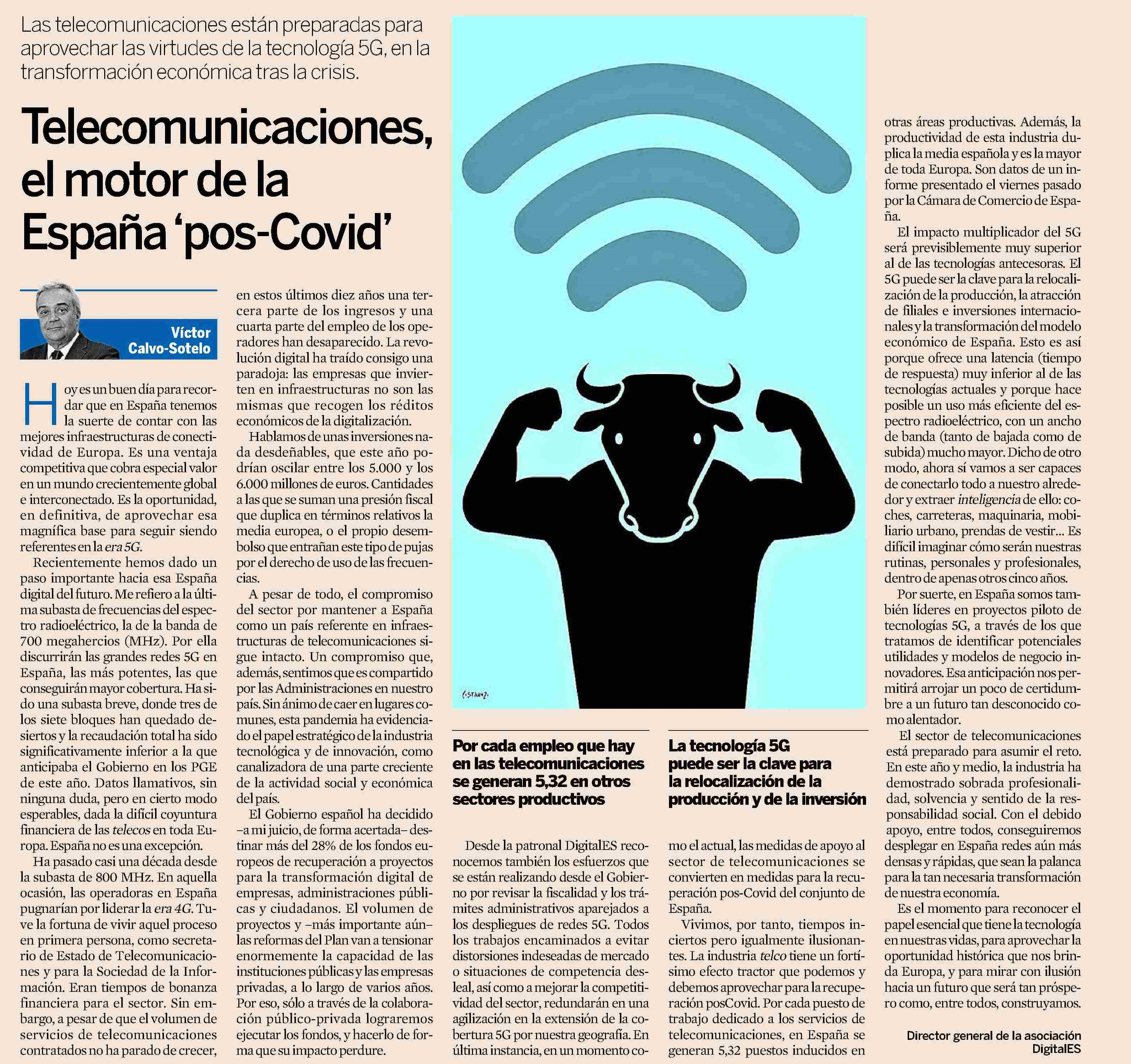31/07/2021
Madrid, July 31, 2021 – The business daily Expansión published this week the following article by the CEO of DigitalES, Víctor Calvo-Sotelo:
Telecommunications, the engine of ‘post-Covid’ Spain
Today is a good day to remember that in Spain we are fortunate to have the best connectivity infrastructures in Europe. It is a competitive advantage that is especially valuable in an increasingly global and interconnected world. It is the opportunity, in short, to take advantage of this magnificent base to continue to be a benchmark in the 5G era.
We have recently taken an important step towards the digital Spain of the future. I am referring to the latest auction of radio spectrum frequencies, the 700 megahertz (MHz) band. The large 5G networks in Spain will run through it, the most powerful ones, the ones that will achieve greater coverage. It has been a short auction, where three of the seven blocks have been deserted and the total collection has been significantly lower than the one anticipated by the Government in this year’s PGE. These figures are undoubtedly striking, but to a certain extent to be expected, given the difficult financial situation of telecoms throughout Europe. Spain is no exception.
A decade has passed since the 800 MHz auction. At that time, operators in Spain were vying to lead the 4G era. I had the good fortune to experience that evolution first-hand, as Secretary of State for Telecommunications and the Information Society. These were good financial times for the sector. However, although the volume of contracted telecommunications services has continued to grow, over the last ten years a third of the operators’ revenues and a quarter of their employment have disappeared. The digital revolution has brought with it a paradox: the companies that invest in infrastructure are not the same ones that reap the economic benefits of digitalization.
We are talking about not inconsiderable investments, which this year could range between 5 and 6 billion euros. In addition to these amounts, there is a tax burden that is double the European average in relative terms, or the actual outlay involved in this type of bidding for the right to use the frequencies.
Despite all this, the sector’s commitment to maintaining Spain as a benchmark country in telecommunications infrastructures remains intact. A commitment that we also feel is shared by the Administrations in our country. Without wishing to fall into commonplaces, this pandemic has highlighted the strategic role of the technology and innovation industry as a channel for a growing part of the country’s social and economic activity.
The Spanish government has decided – in my opinion, wisely – to allocate more than 28% of European recovery funds to projects for the digital transformation of companies, public administrations and citizens. The volume of projects and – more importantly – the Plan’s reforms will put enormous strain on the capacity of public institutions and private companies over several years. Therefore, only through public-private collaboration will we be able to execute the funds, and do so in such a way that their impact will last.
DigitalES also recognizes the efforts being made by the Government to review the taxation and administrative procedures associated with 5G network deployments. All work aimed at avoiding undesired market distortions or situations of unfair competition, as well as improving the competitiveness of the sector, will result in speeding up the extension of 5G coverage throughout our geography. Ultimately, at a time like the present, measures to support the telecommunications sector become measures for the post-Covid recovery of Spain as a whole.
We live, therefore, in uncertain but equally exciting times. The telco industry has a very strong tractor effect that we can and should take advantage of for the post-Covid recovery. For every job dedicated to telecommunications services in Spain, 5.32 induced jobs are generated in other productive areas. Moreover, the productivity of this industry is double the Spanish average and is the highest in Europe. These are data from a report presented last Friday by the Spanish Chamber of Commerce.
The multiplier impact of 5G is expected to be much greater than that of its predecessor technologies. 5G could be the key to relocating production, attracting international subsidiaries and investment, and transforming Spain’s economic model. This is because it offers much lower latency (response time) than current technologies and because it enables a more efficient use of the radio spectrum, with much greater bandwidth (both downstream and upstream). In other words, we will now be able to connect everything around us and extract ‘intelligence’ from it: cars, roads, machinery, urban furniture, clothing… It is difficult to imagine what our personal and professional routines will be like in just another five years.
Fortunately, in Spain we are also leaders in 5G technology pilot projects, through which we try to identify potential utilities and innovative business models. This anticipation will allow us to shed some certainty on a future that is as unknown as it is encouraging.
The telecommunications sector is ready to take on the challenge. In the past year and a half, the industry has demonstrated its professionalism, solvency and sense of social responsibility. With the right support, together we will be able to deploy even denser and faster networks in Spain, which will be the lever for the much-needed transformation of our economy.
Now is the time to recognize the essential role that technology plays in our lives, to seize the historic opportunity that Europe offers us, and to look forward to a future that will be as prosperous as, together, we build it.
Related information:
> 5G (700 MHz) Frequency Auction Conditions
> Briefing Note: Recovery, Transformation and Resilience Plan
> DigitalES – Working Line: 5G Business Models
> DigitalES – Taskforce: Recovery Plan










